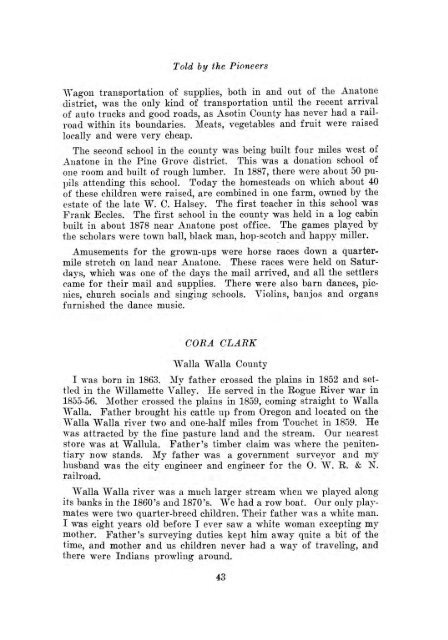TOLD by the PIONEERS - Washington Secretary of State
TOLD by the PIONEERS - Washington Secretary of State
TOLD by the PIONEERS - Washington Secretary of State
You also want an ePaper? Increase the reach of your titles
YUMPU automatically turns print PDFs into web optimized ePapers that Google loves.
Told <strong>by</strong> <strong>the</strong> Pioneers<br />
,fagon transportation <strong>of</strong> supplies, both in and out <strong>of</strong> <strong>the</strong> Anatone<br />
district, was <strong>the</strong> only kind <strong>of</strong> transportation until <strong>the</strong> recent arrival<br />
<strong>of</strong> auto trucks and good roads, as Asotin County has never had a railroad<br />
within its boundaries. Meats, vegetables and fruit were raised<br />
locally and were very cheap.<br />
The second school in <strong>the</strong> county was being built four miles west <strong>of</strong><br />
Anatone in <strong>the</strong> Pine Grove district. This was a donation school <strong>of</strong><br />
one room and built <strong>of</strong> rough lumber. In 1887, <strong>the</strong>re were about 50 pupils<br />
attending this school. Today <strong>the</strong> homesteads on which about 40<br />
<strong>of</strong> <strong>the</strong>se children were raised, are combined in one farm, owned <strong>by</strong> <strong>the</strong><br />
estate <strong>of</strong> <strong>the</strong> late W. C. Halsey. The first teacher in this school was<br />
Frank Eccles. The first school in <strong>the</strong> county was held in a log cabin<br />
built in about 1878 near Anatone post <strong>of</strong>fice. The games played <strong>by</strong><br />
<strong>the</strong> scholars were town ball, black man, hop-scotch and happy miller.<br />
Amusements for <strong>the</strong> grown-ups were horse races down a quartermile<br />
stretch on land near Anatone. These races were held on Saturdays,<br />
which was one <strong>of</strong> <strong>the</strong> days <strong>the</strong> mail arrived, and all <strong>the</strong> settlers<br />
came for <strong>the</strong>ir mail and supplies. There were also barn dances, picnics,<br />
church socials and singing schools. Violins, banjos and organs<br />
furnished <strong>the</strong> dance music.<br />
CORA CLARK<br />
,Valla Walla County<br />
I was born in 1863. My fa<strong>the</strong>r crossed <strong>the</strong> plains in 1852 and settled<br />
in <strong>the</strong> Willamette Valley. He served in <strong>the</strong> Rogue River war in<br />
1855-56. Mo<strong>the</strong>r crossed <strong>the</strong> plains in 1859, coming straight to ,Valla<br />
'Valla. Fa<strong>the</strong>r brought his cattle up from Oregon and located on <strong>the</strong><br />
'VaHa WaHa river two and one-half miles from Touchet in 1859. He<br />
was attracted <strong>by</strong> <strong>the</strong> fine pasture land and <strong>the</strong> stream. Our nearest<br />
store was at Wallula. Fa<strong>the</strong>r's timber claim was where <strong>the</strong> penitentiary<br />
now stands. My fa<strong>the</strong>r was a government surveyor and my<br />
husband was <strong>the</strong> city engineer and engineer for <strong>the</strong> O. 'V. R. & N.<br />
railroad.<br />
,VaHa ,VaHa river was a much larger stream when we played along<br />
its banks in <strong>the</strong> 1860's and 1870's. vVe had a row boat. Our only playmates<br />
were two quarter-breed children. Their fa<strong>the</strong>r ,vas a white man.<br />
I was eight years old before I ever saw a white woman excepting my<br />
mo<strong>the</strong>r. Fa<strong>the</strong>r's surveying duties kept him away quite a bit <strong>of</strong> <strong>the</strong><br />
time, and mo<strong>the</strong>r and us children never had a way <strong>of</strong> traveling, and<br />
<strong>the</strong>re were Indians prowling around.<br />
43

















